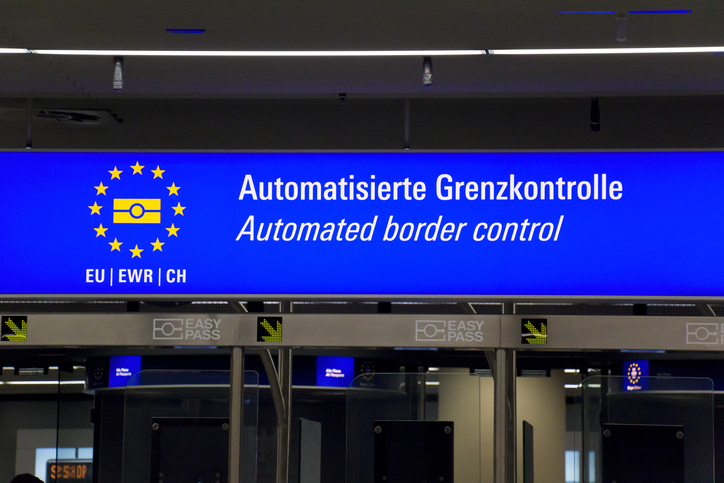As I was passing through Stockholm’s Arlanda airport last week, a WhatsApp from a colleague pinged into my phone as I came through arrivals, so I’m able, as it happens, to quote verbatim my thoughts at the time: ‘Just in the arrivals hall now, and as I queue in “all other passports”, I am once again reminded of what a stupid [expletive deleted] idea Brexit was.’ I may, indeed, to my shame, have added some unflattering reflections on the policy of the magazine I have the honour to work for.
For most people, it’s only in that passport queue that they will think about Brexit much at all
It strikes me that my experience in that passport queue, and the experience of many like me, was one of the last real Brexit noticeables. For as time goes on, the effects of Brexit – both positive and negative – become less and less visible to most of us. Sure, we can argue until we’re blue in the passport about whether we are significantly poorer than we would have been had we stayed in the EU, or whether we have, conversely, been showered with ‘Brexit dividends’. Nobody who takes either position will be remotely persuaded by the arguments of those who take the other, and most people of sound mind won’t take much of a position at all. The jam has been stirred through the semolina. Economics is a fuzzy discipline at the best of times, and economic counterfactuals are fuzzier still. The moment someone pulls out a slide deck of pie charts and starts burbling on about rates of change in GDP and hypothecated tax spending, all normal people glaze over and turn their attention to Gardeners’ Question Time.
Tangible benefits and harms – the ones you feel in the heart and gut if they are symbolic ones, or in the pocket if they are material ones – are what move elections. And much as the likes of me will regret it, the further that 2016’s climacteric recedes into the past, the thinner and less persuasive arguments about Brexit’s economic harms become – and as Project Fear’s defeat by Project Take Back Control showed, they weren’t all that persuasive at the time.
Shoulda beens, mighta beens: all in the past. There is no control experiment. We are where we are. The shuttered fishmonger reopens as a bakery or a Ladbroke’s. Steve Bray eventually gets tired of shouting, or the batteries in his megaphone run out, and peace descends again on Parliament Square. Inertia favours the status quo.
There’s the odd patriot who, no doubt, rubs the cover of his blue passport with a proud thumb and feels a swelling of pleasure in the knowledge that Brexit gave him that passport. Such a person will no doubt stand waiting for a stamp for 45 minutes in ‘All Other Passports’ with bulldog stoicism while Johnny Foreigner whizzes through the e-passport gates smugly. He will account his wait as a price amply worth paying for the privilege of Taking Back Control.
But for most people, I suspect, it’s only in that passport queue that they will think about Brexit much at all. It will indeed be their once or twice a year chance to be once again reminded of what a stupid [expletive deleted] idea Brexit was. This is not insignificant. I’ve long thought that perhaps the most profound and enduring effect of the 11 September attacks in New York in 2001 was the tightening of airport security.
How many trillions of hours of wasted time, how many human lifetimes, cumulatively, has the post-9/11 regime in almost every airport cost the western world? In lost time, in discontent and annoyance, in hours of productive work forgone in airport queues? Those billions of boots wearily unlaced and shucked, those laptops removed from hand luggage, those bottles of cosmetics sealed in transparent bags, those belts rolled and placed in jacket pockets. One doesn’t like to say ‘the terrorists have won’ but in this respect, they undoubtedly did. The response to their barbarism continues to affect millions of people every single day, a quarter century after a handful of jihadi nutbags flew those planes into those buildings in New York.
So if Sir Keir Starmer’s new deal with the EU does, as has been trailed, contain a provision that Britons will be able to use the e-passport gates in European airports like everybody else, that’s a huge thing. (Leave aside for the moment the question of why, if the technology has always been completely compatible anyway, EU countries were sending us to have our documents manually stamped in ‘all other passports’ anyway. Post-Brexit spite?)
We can argue back and forth over whether, for instance, alignment on EU trade standards is a Sickening Betrayal of Brexit (the inevitable Tory position) or a Thrillingly Independent Sovereign Decision to do exactly what the EU would have us do anyway (the already stated Labour position). But what most people will notice, or now cease to notice, is the length of the queue in the arrivals hall as they set off on their holidays. If they’re not noticing that – if they’re not getting a once- or twice-annual tangible, material reminder of what a stupid [expletive deleted] idea Brexit was – they will tend to forget that Brexit happened at all.
In this respect, far from betraying Brexit with his trade deal, Sir Keir may indeed for a generation, woe though it causes me to say so, be putting the last nail in the coffin of Rejoin.








Comments